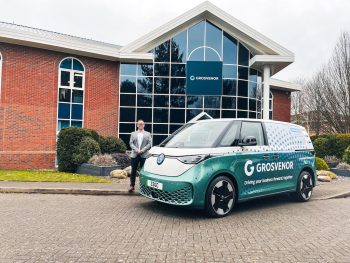Grosvenor Leasing has shifted its strategic direction, accompanied by a major rebrand, to meet the future needs of businesses with vehicle fleets.

The fleet specialist is repositioning to reflect its expanding portfolio of fleet funding and management solutions aimed at more agile workforces, offering greater choice as to how employees get from A to B.
At the same time, Grosvenor will continue to offer its core leasing, fleet management and salary sacrifice solutions, underpinned by its customary high levels of customer service.
Extensive customer and industry research by Grosvenor found a shift towards sustainable, flexible and technology-driven transportation solutions, driven by environmental concerns, changing work patterns, and the preferences of a new generation.
Yet, despite the increased use of technology, Grosvenor’s research also reinforced the desire that software should enhance, but not replace, traditional customer service. The ability to talk to someone remains key, with customers and drivers not wishing to do everything through an app.
Grosvenor’s rebrand aligns with the evolving needs in mobility and tech-led solutions, including through enhancements to its technology and app as customers demand leading digital solutions underpinned by people and personal service. The business will also deliver expanding services to meet future needs such as mobility as a service (MaaS).
Lee Brown, managing director, said: “The move to EVs, the importance of ESG (environmental, social and governance), wellbeing and CSR (corporate social responsibility) are all driving change, with AI also set to transform our lives. Younger and more tech-savvy drivers are poised to drive change and are far more environmentally aware than previous generations.
“As a result, we are readying ourselves for a future where flexible app-based, sustainable travel solutions will be used alongside, or even instead of, traditional company cars and grey fleet.”
But Brown stressed the research confirmed Grosvenor’s longstanding belief that “we need to continue to uphold our values, by working with integrity, excellence and agility, plus prioritise the personal touch by offering even greater access to our staff and management in a market increasingly focused on digitisation”.
Brown elaborated: “We will therefore continue to provide innovative, forward-thinking and flexible vehicle funding, fleet management, EV salary sacrifice and personal leasing solutions, while extending our offering to mobility solutions, car sharing, e-bikes and scooters and last mile delivery solutions for commercial vehicle operators.
“It’s for this reason why we have launched our new brand, as it reflects a shift in our proposition to take us into the next generation of mobile workforces.”
Major takeaways from the research by Grosvenor, which has a fleet size of over 20,000 vehicles, include an increasing reliance among businesses on outsourced fleet management as the number of dedicated fleet managers declines, and with roles such as HR and operations, with less experience, taking on these responsibilities.
The study also underscored the increased complexity of fleet management due to health and safety, environmental, social, and governance (ESG) considerations, zero emissions targets, compliance and technology.
It also revealed evolving driving habits and working practices among younger drivers, who are increasingly focused on zero-emission motoring and climate change. This tech-savvy workforce expect mobile app solutions for everything, including travel.
In line with this, Grosvenor’s work will include systems and app improvements to enhance customer experience, including better automation, market-leading functionality, seamless integration of products and services and freeing up staff to focus on customer interaction.
Service development will include expanding services to meet future market needs, such as MaaS, car sharing, and e-bikes, potentially through in-house development or white-labelling.
Grosvenor, which was founded in 1981 and has been supporting business fleets businesses large and small for over 40 years, stressed that the new strategy focuses on building upon existing strengths, not wholesale changes, and will draw on its key strengths in proposition, workforce, reputation and client base.

